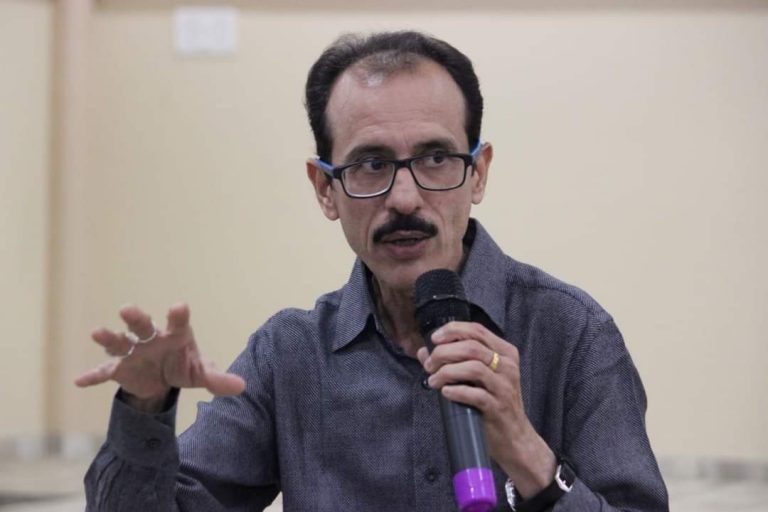
Based in Ahmedabad, India, Kumar has performed in four Sindhi movies, scores of Sindhi, Gujarati and Hindi plays, stage shows and radio/TV programs.
Kumar Ghanshani says, “Making verbal claims of being a Proud Sindhi is not enough. The community should prove it practically and make Sindhi film industry and theater a success”.
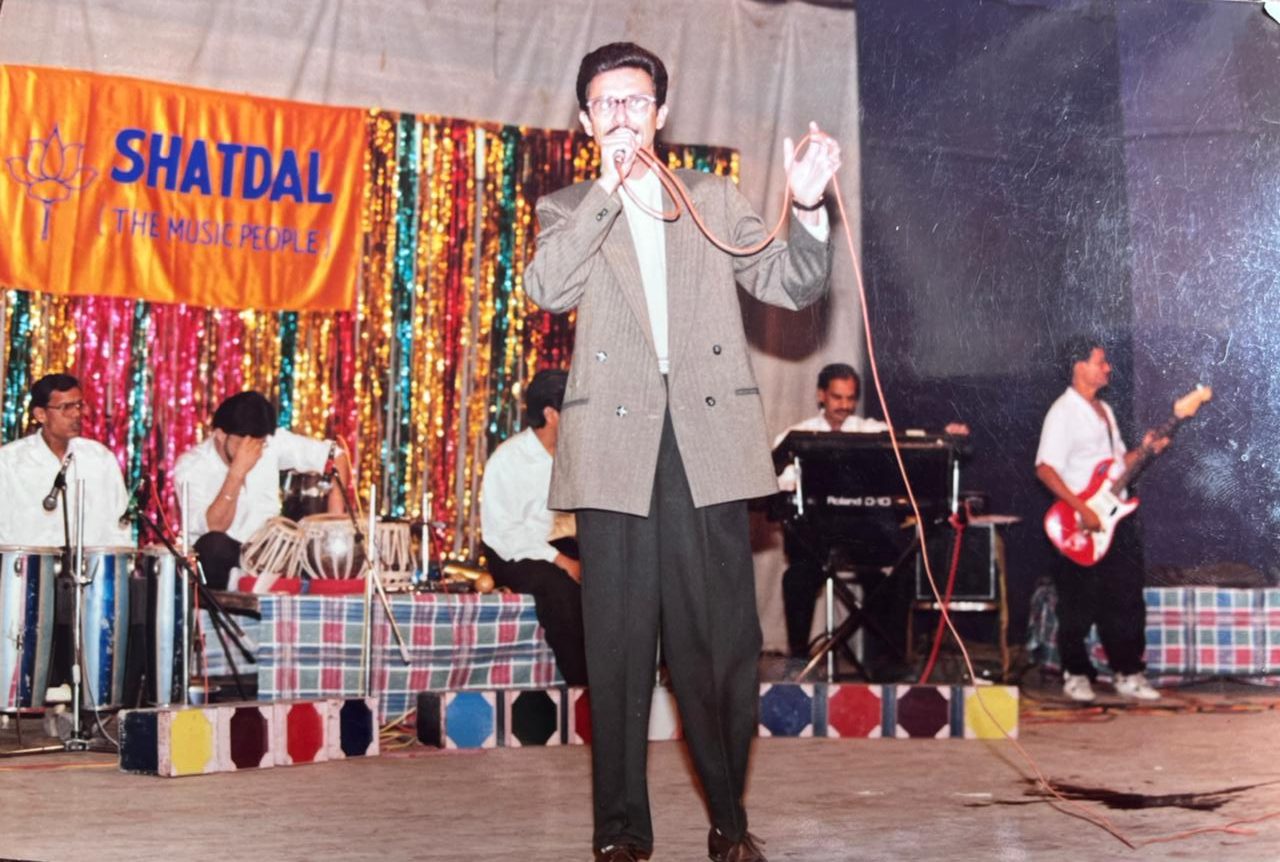 [Kumar Ghanshani is a versatile artist having earned fame for his theater performance, acting in Sindhi films, live radio and TV compering, stage shows, mimicry and writing scripts and dialogues etc. Based in Ahmedabad city of Gujarat state of India, Kumar is a well-educated person. During his career, Kumar has performed in hundreds of stage plays, radio dramas, stage shows etc. Sindh Courier approached him recently and had a detailed conversation on his family background, his life as an artist and several aspects of art, especially the prerequisites for being an artist – Nasir Aijaz, Editor]
[Kumar Ghanshani is a versatile artist having earned fame for his theater performance, acting in Sindhi films, live radio and TV compering, stage shows, mimicry and writing scripts and dialogues etc. Based in Ahmedabad city of Gujarat state of India, Kumar is a well-educated person. During his career, Kumar has performed in hundreds of stage plays, radio dramas, stage shows etc. Sindh Courier approached him recently and had a detailed conversation on his family background, his life as an artist and several aspects of art, especially the prerequisites for being an artist – Nasir Aijaz, Editor]
Sindh Courier
SC: Our readers would like to know about your family background and the ancestors. Where did they live Sindh, and when and where did they migrated to settle in India?
KG: Bhau (Brother), my ancestors belonged to Nasarpur – a historical town of Sindh. They were Amils, the Kamora (Bureaucrats/Government Officers). They migrated in 1947 and first came to Jodhpur and then settled in Ahmedabad, India. My father Dr. Gul Ghanshani was also born in Nasarpur Sindh.
SC: Would you share about schooling and higher education?
KG: I studied at Adrish High School, a Sindhi medium school, and then graduated in commerce. But later, I did masters in Hindi Literature from Rajasthan University. At this stage, I made up my mind switch over to art, and thus completed a 2-year diploma in Drama from the Gujarat University.
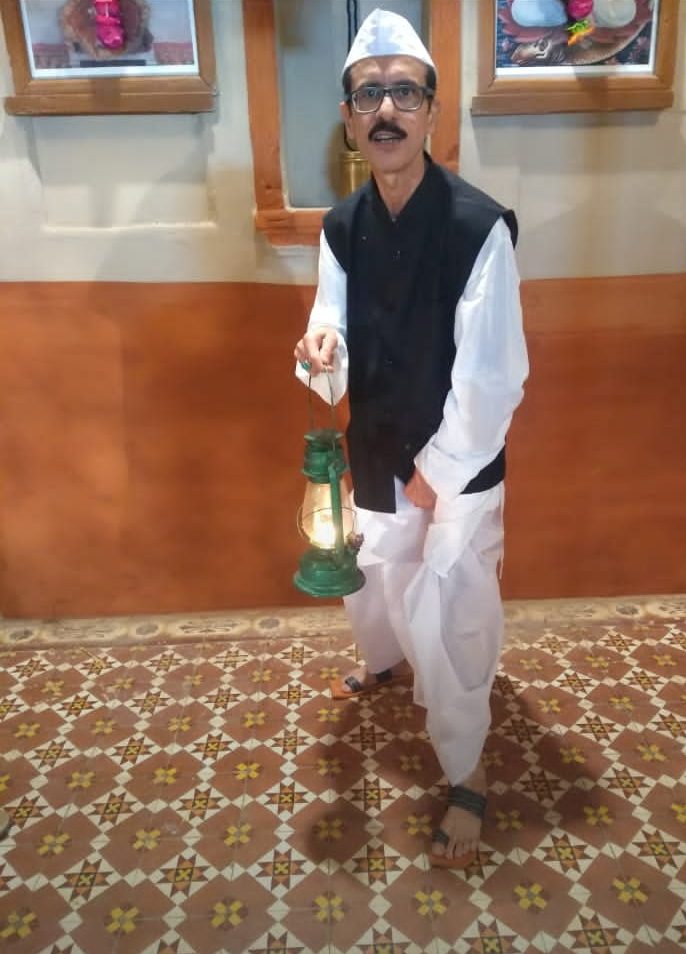 SC: Isn’t it amazing that a commerce graduate studied Hindi Literature and then switched over to the art? What were the reasons behind it?
SC: Isn’t it amazing that a commerce graduate studied Hindi Literature and then switched over to the art? What were the reasons behind it?
KG: In fact the home atmosphere influenced me a lot. My father Dr. Gul Ghanshani was himself an actor, director, orator, cartoonist, writer, poet, and had an in-depth knowledge of Urdu literature. My mother, brothers and sisters too were associated with the field of art, particularly the theater.
It was the family influence that I was inclined to the art since early age. During my school life I actively participated in such activities and used to do anchoring/compering, acting and rendered Prarthna and ‘Thought of the Day’, which was a daily routine. I also participated in such programs at district level. These were the indicators that made me to choose this field.
SC: When did you perform in your first stage play?
KG: I don’t remember the first play, as I had been performing small roles since school life, and by the time I completed graduation, I had performed in some two to three dozen Sindhi and Gujarati plays. But my first full length drama, a 3-act play, was ‘Paigham’ (The Message), scripted by my brother. I had the opportunity to work with various theater organizations. Such theater companies were of Vikram Shahani, Chandi Samnani, and the other one of my brother Baldev Ghanshani. And also, our own company Sindhu Kalakar Mandal. We also had guidance of other stalwarts like Uttamchandani. I performed in 12 three-act plays and some 15 one-act plays of Sindhu Kalakar Mandal.
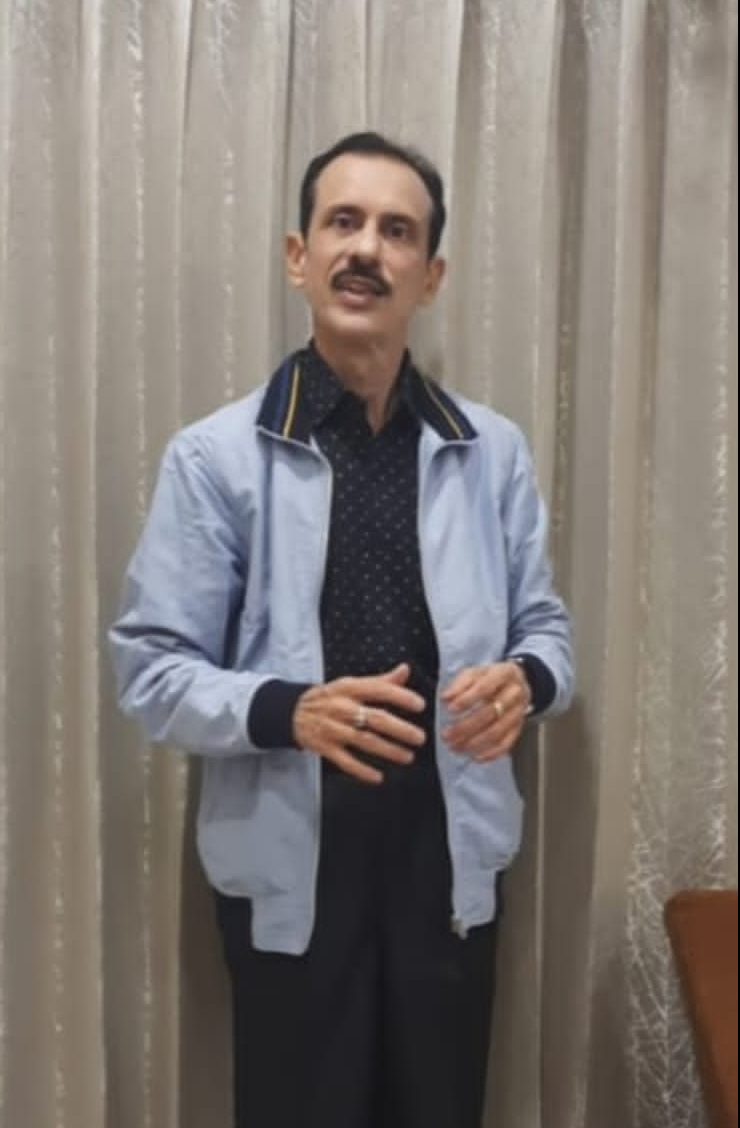 SC: As you told, you gained lot of experience in theater and other related fields, even then you needed to do a diploma in drama?
SC: As you told, you gained lot of experience in theater and other related fields, even then you needed to do a diploma in drama?
KG: I had a different perception in this regard. I think one should learn all the aspects of the field, he specifically choses. Every field has its own grammar, and one should have command over it. Take the example of the field of theater – it has a number of aspects one must learn, like voice modulation, face expressions, movement, posture, stage composition, costumes and lighting etc. These all things we have to learn from the Gurus.
It’s true, and I do believe that the art and talent is gifted by the God, but one needs grooming through learning i.e. methods, and for that artists or actors are called Method Actors.
SC: How do you select the character in a drama, and what is your technique to perform?
KG: Fortunately or unfortunately, I have never been given an opportunity to select any role for myself, as always, major roles have been offered to me. But yes, as everybody has his own technique, I too have. I use to study the script thoroughly for four to five times; I use to study the other characters as well as my own besides the surrounding atmosphere depicted in the script, and then I use to add some words and such other things to make the character lively – that’s adding the Mirch Masalha (Spices).
SC: You also have performed in radio dramas. Do you see any difference between stage drama and radio drama? How do you perform and give effects without presence of an audience?
KG: Yes both are different fields in a sense that one has to perform in presence of audience while the other one is performing on air. But the voice modulation works in both fields. It’s the voice modulation of an actor that makes a radio listener to feel the movements of performer.
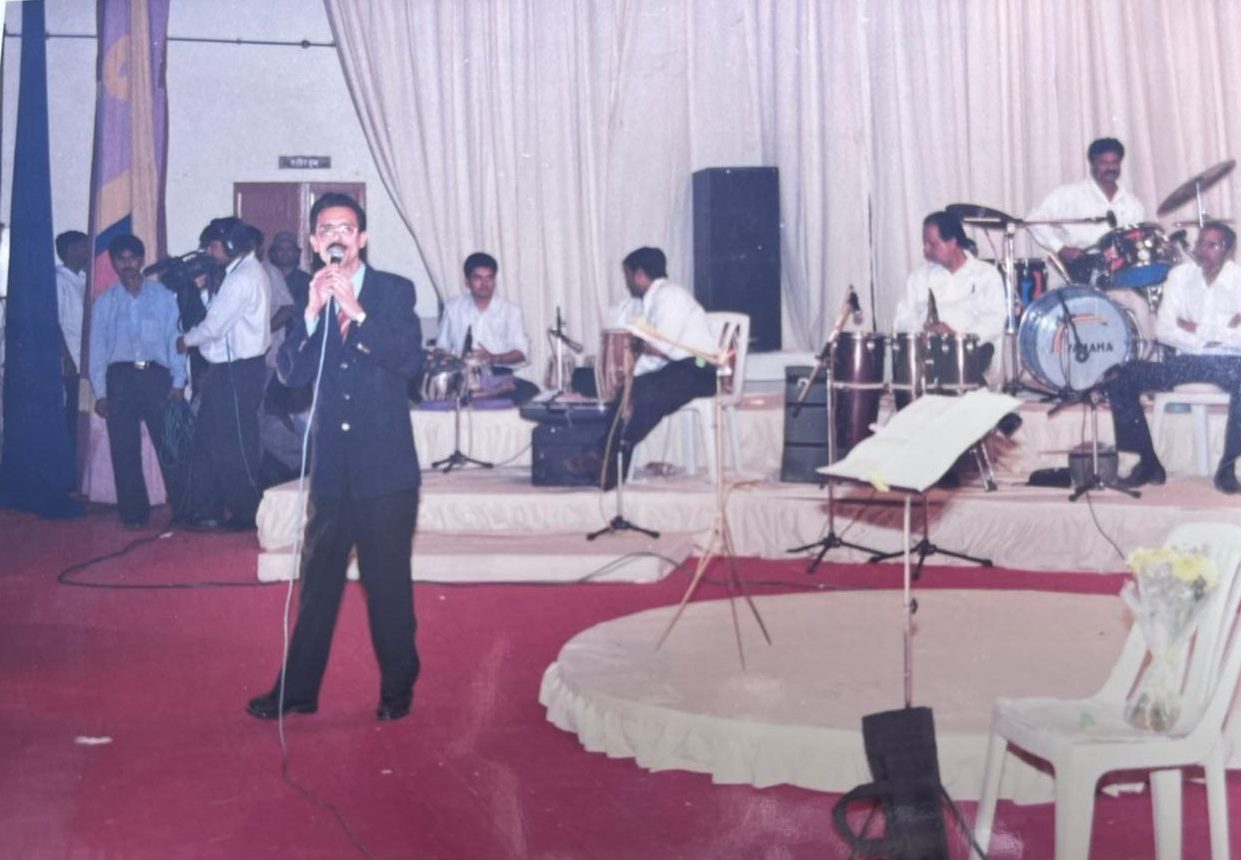 SC: What are the prerequisites for new entrants in the field of acting?
SC: What are the prerequisites for new entrants in the field of acting?
KG: Any artist must be sincere to his profession. Punctuality and spirit of team work are also some of the prerequisites but above all he must keep aside his ego, as it will help one to develop team spirit and mix up with the team members. For ensuring quality of work, the new entrants must keep eye on what is happening in his surroundings and the world; they should have imagination, and remember events or incidents, taking place in surroundings, as such memories will help them develop true feelings in the character.
SC: Would you share your experience about script writing and how you started radio/TV compering and mimicry?
KG: Once I was assigned to improve a script of a play. It was a 3-act drama and I had to change it into one-act. At some stage I also translated drama scripts from Gujarati. This experience made me to think that I can write the scripts also.
While writing scripts I use to develop a theme, as no story could be authored without theme. I always choose the themes that have social message. The next step is creating the characters and then developing it into a script.
As regards anchoring, I started it from a program on Doordarshan. One day I was called to conduct a program as their announcer could not come. I didn’t feel any difficulty, being well-versed with Hindi and Urdu languages. After my first program, I was asked to continue, and soon earned fame, and the programmers started booking me.
During my stage shows, I often did mimicry, which was liked much by the audience. My father was opposed to doing mimicry, but the fact is that it helped me a lot to get bookings.
As I told, I have been performing in radio plays, but I feel more comfortable at the stage.
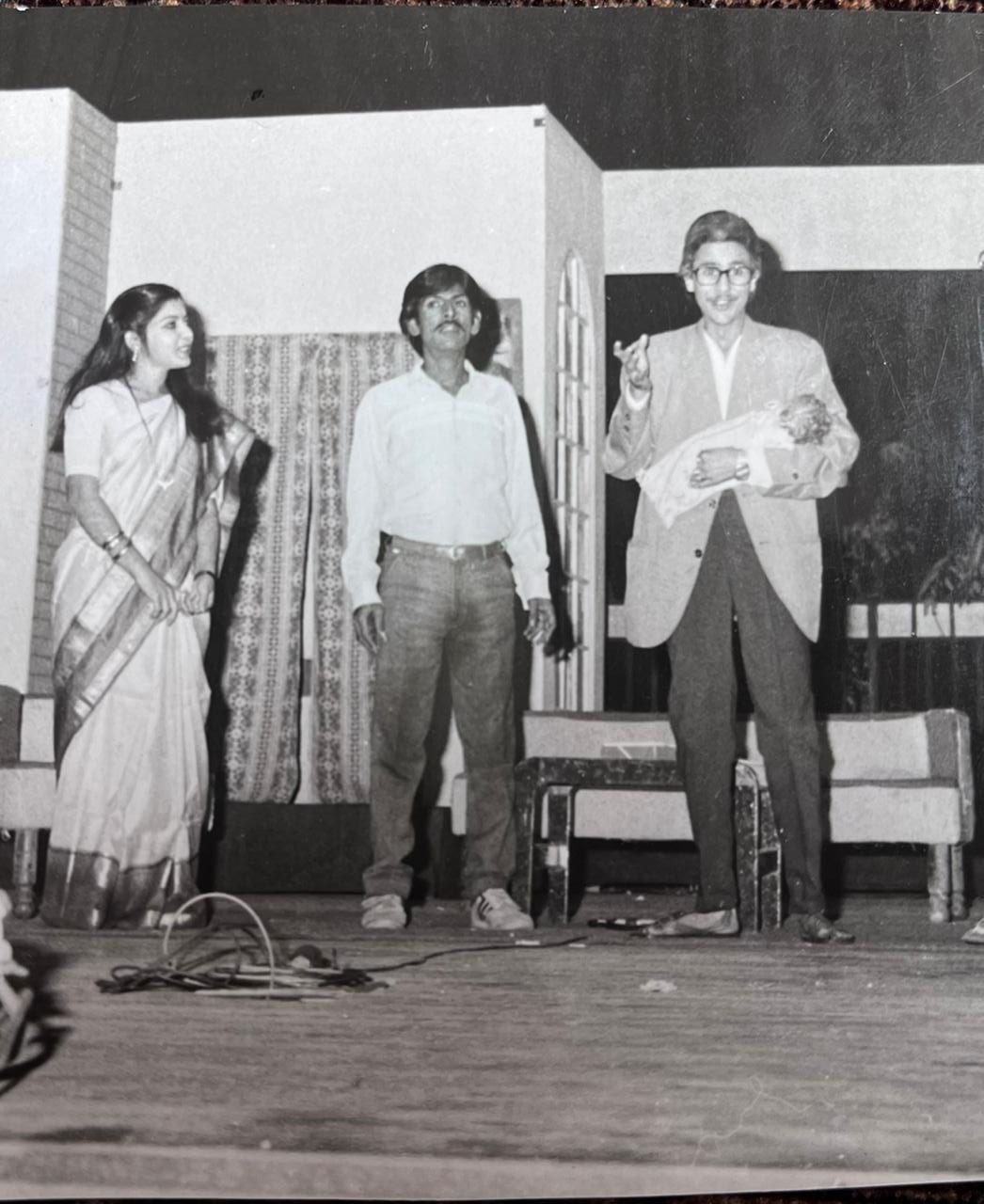 SC: You have also played roles in some Sindhi movies. Share your experience as well as observation about Sindhi film industry, and response of Sindhi community to Sindhi movies and also Sindhi theater.
SC: You have also played roles in some Sindhi movies. Share your experience as well as observation about Sindhi film industry, and response of Sindhi community to Sindhi movies and also Sindhi theater.
KG: Yes Bhau, I have acted in four Sindhi movies and wrote dialogues of two movies.
As regards community response, I would say, it’s very poor. I have observed that the Sindhis have no liking for Sindhi movies. They will spend hundreds of rupees to watch Hindi Bollywood movies but would avoid spending on Sindhi movies. They do not turn up even if offered free tickets. You would be surprised to know that hardly two shows of any Sindhi movie could be held in Ahmedabad. Compelled by such an attitude of community towards Sindhi movies, the producers and directors have to approach the well-off people or certain organizations to sponsor their film shows. Similar situation is faced by Sindhi theater. The Sindhi plays too are sponsored by even then hardly 200 people could be seen in a hall having capacity of 700.
Another factor which hinders the success of Sindhi Film Industry is that Sindhi community is scattered across India living in pockets in different cities.
SC: Do you think any change could be brought about to ensure success of Sindh Film Industry, and how?
KG: In my view, it’s only the Sindhi community that could promote Sindhi Film Industry. When they proudly claim being a Sindhi, they should prove it. Making verbal claims is not enough, they should do it practically and come forward. There are a number of social, educational and other organizations of Sindhis, there are lot of temples and educational institutions managed by Sindhis, which too have to play their role. They should buy tickets in bulk and bring students and other Sindhis of different walks of life to watch Sindhi movies in cinemas.
Lastly, I think the financers should also come forward for producing Sindhi movies. But again the main issue is who will put in their money to produce a Sindhi film that doesn’t recover even the amount they have invested.
__________________
(Interviewed through WhatsApp Voice Messages)